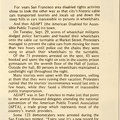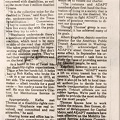Austin American-Statesman Sunday, October 25, 1987 Lifestyle section
Title: Streetcars and Desire
Activist couple dedicate lives to tearing down walls between city buses and the disabled
By Carlos Vidal Greth, American-Statesman Staff
(This is a compilation of the article that is on ADAPT 354 and ADAPT 353. The content is all included here for easier reading.)
Most visitors to the Bay Area relish the opportunity to hop a cable car and "climb halfway to the stars," as Tony Bennett croons in his signature song, I Left My Heart in San Francisco. Stephanie Thomas, organizer for Americans Disabled for Accessible Public Transportation, had other ideas. "To mobility-impaired people, keeping those historic symbols of public transit alive memorializes inaccessibility and makes it seem like a positive thing," she said. ADAPT, a national civil-rights group, strives to make it easier for disabled people to ride city buses. They differ from mainstream disability-rights groups in that members sometimes commit acts of civil disobedience when the usual political channels clog or hit a dead end.
Thomas, her husband Bob Kafka, and eight other Austinites went to San Francisco in late September to conduct a protest during the national convention of the American Public Transit Association, a lobbying organization. Kafka and 15 others were arrested when they climbed out of their wheelchairs and staged a sit-in at the cable car turnaround at Powell and Market streets. Thomas was arrested twice, once for blocking a shuttle bus and once for blocking a cable car. "I've been arrested eight times or so," she said. "I've lost count. Bob has been arrested 14 times. The police are usually aware it's a demonstration about civil rights, and that we're not out to hurt their city. But it's scary. We're not automatons. Some members break down and cry when they go to prison."
As far as Thomas is concerned, the suffering has been worth it. "The demonstrations got national exposure. More important, we got the transit association's attention. They are beginning to listen."
Thomas, who is also executive director of the Coalition of Texans With Disabilities, could sit for a poster portrait of the committed political activist. Her shock of amber hair shifts of its own accord like the wind ruffling a field of grain. Wide, blue eyes fix visitors with the riveting gaze of a woman who believes she fights for what is right.
She was born 30 years ago in New York to parents who fought for justice in their way. Her father organized political campaigns and worked for arms control. Her mother, a writer, was involved in the women's movement.
"Mom taught me to question people's perceptions," Thomas said. "The women's and disabled movements have something in common: We're defined by our bodies. You have to fight that all the time."
Her first protest occurred when she was in elementary school. Mothers in the apartment building where her family lived wanted to establish a day-care center. The owners didn't want to provide the space. "Women and children took over the building," Thomas said. "We weren't angry college protestors. We were non-threatening moms and kids. But our presence made a difference."
Despite her progressive upbringing, she was a shy girl who hid from the world behind the covers of books.
When she was 17, her legs were paralyzed when she fell off a farm tractor while doing chores. What could have been a tragedy turned her life around. "I realized that life doesn't go on forever, and that you need to make the most of every moment," Thomas said.
Thomas attended Harvard, where she and other disabled students organized a group to help make campus more accessible. "When I look back, I see we were very tame,” she said. “We were polite but usually got what we asked for.”
Over the years, Thomas became increasingly active in disability rights. She got involved in independent living centers, communities of disabled people supporting one another so they can live with dignity outside institutions. In the early 1980s, she joined the Austin Resources Center for Independent Living. She went to work for the Coalition of Texans With Disabilities in 1985.
The 9-year-old coalition lobbies for, represents and coordinates 90 organizations (including ADAPT) concerned with disabilities, as well as the more than 2 million disabled Texans.
“It is the collective voice for the disabled in Texas,” said Kaye Beneke, spokeswoman for the Texas Rehabilitation Commission. "They’re committed - the members live every day with the problems they try to solve.
“Stephanie understands there’s a spectrum of political views in the coalition, which tend to be more middle-of-the-road than ADAPT. She takes responsibility for the representing of all those views. But don’t call the coalition passive. They’ve had their way in the legislature and on the local level.”
As a leader in two of Texas major disability-rights organizations, Thomas has her hands full. It helps having Bob Kafka, who broke his back in a car accident in 1973, at her side. The experienced trouble maker -- albeit trouble for a good cause -- has made a name for himself. He won the Governor’s Citation for Meritorious Service in 1986.
Appropriately, Kafka met Thomas at a disability-rights conference. “Stephanie was real involved, real committed and real attractive,” he said.
Sharing home and office has increased their commitment to the cause they serve- and to each other. “Bob and I are an activist couple,” Thomas said. “It’s intense because we work so closely. But it’s rewarding. It has made us an incredibly tight couple.”
Thomas has to rework her concept of activism when she joined ADAPT. “Demonstrations force the public to look at disabled people in a different light,” she said. “The cripple is the epitome of powerlessness. We say we’re sorry if it scares you to look at me, but we have to live our lives.”
Confrontation, however can cost allies as well as foes.
This year, the Paralyzed Veterans of America severed ties with ADAPT and any organization "advocating illegal civil disobedience.”
“Our charter states that we must act in accordance with the laws of the land,” said Phil Rabin, director of education. “To act otherwise would be to violate our charter.
“The veterans and ADAPT members share first-hand the frustration of living in a society that is not accessible to the disabled. We don’t want to fight ADAPT. It’s a waste of precious resources to divert our energies.”
Though Thomas’ group is controversial, it has achieved many of its goals. Albert Engleken, deputy executive director for the American Public Transit Association in Washington, D.C., acknowledged that ADAPT’s street theater has had some effect. In September his organization created a task force to study the issue of providing service for disabled, he said.
Engelken, however is not a convert to their cause. “ADAPT wants a lift on every transit bus in the country,” Engelken said. “We believe it should be left to local transit authorities to decide how to handle transportation for disabled people. Transit officials are not robber barons. We’re paid by the public to provide the most mobility for the most people.”
Thomas knows how to work within the system. Ben Gomez, director of development for Capital Metro, said ADAPT members have been effective on the Mobility Impaired Service Advisory Committee, which makes recommendations on service to the transit authority board of directors.
“They’re well-organized,” Gomez said. “We don’t always agree on the approach and issues. We’ve made many of the adjustments they’ve asked for, but not always within their time frame.”
The concessions have been gratifying, but Thomas has only begun to fight. “ADAPT took a dead issue änd made it hot again,” she said.
For information on American Disabled for Accessible Public Transportation, write to ADAPT of Texas, 2810 Pearl, Austin 78705/ To learn more about the Coalition of Texans With Disabilities, call 443-8252, or write to P.O. Box 4709, Austin 78765. [curator note: addresses and phone numbers no longer valid]
Staff Photo by Mike Boroff: A man (Bob Kafka) with Canadian (wrist cuff) crutches, a plaid shirt, light colored jeans and sneakers sits in the lap of a woman (Stephanie Thomas) with wild big hair and a button down shirt. She is sitting in a manual wheelchair.
Caption reads: "Bob and I are an activist couple,” says Stephanie Thomas who met Bob Kafka at a rights conference. “It’s intense because we work so closely. But it’s rewarding.”
Photo by Russ Curtis: A group of protesters are looking up at something over their heads and their mouths are open shouting. In the front of the picture a woman in a manual wheelchair (Stephanie Thomas) is sitting on a line on the pavement that reads passenger zone. She has her finger raised pointing and is wearing a t-shirt with the ADAPT no-steps logo. Beside her is a man (Jim Parker) with a headband looking back over his shoulder, beside him another man in a wheelchair. Behind Jim stands a woman (Babs Johnson) with her arms by her sides and her mouth open yelling. Behind her a line of other protesters is arriving.
Caption reads: ADAPT organizer Stephanie Thomas traveled to San Francisco to participate in a rally protesting the policies of the American Public Transit Association.
- Author
- Carlos Vidal Greth, American-Statesman Staff
- Created on
- Thursday 11 July 2013
- Posted on
- Thursday 3 August 2017
- Tags
- 1 week advance reservation, 1/2 peak time access, 100% lift equipped, 14th Ammendment, ADAPT - American Disabled for Accessible Public Transportation, Albert Engelken, APTA - American Public Transit Association, arrests, Austin TX, Babs Johnson, Bay area, black experience, blocking a bus, Bob Kafka, cable car turnaround, cable cars, Capital Metro, center for independent living, civil disobedience, civil rights, cockroaches, crippled, CTD - Coalition of Texans with Disabilities, jail, Jim Parker, Kaye Beneke, lack of access, lifts on all NEW buses, lobbiests, local option, Market St, militant, Nevitt, non-association, poem, Powell St, PVA - Paralyzed Veterans of America, Ryan Duncan, San Francisco, sit-in, Stephanie Thomas, women's movement
- Albums
- Visits
- 6515
- Rating score
- no rate
- Rate this photo


0 comments